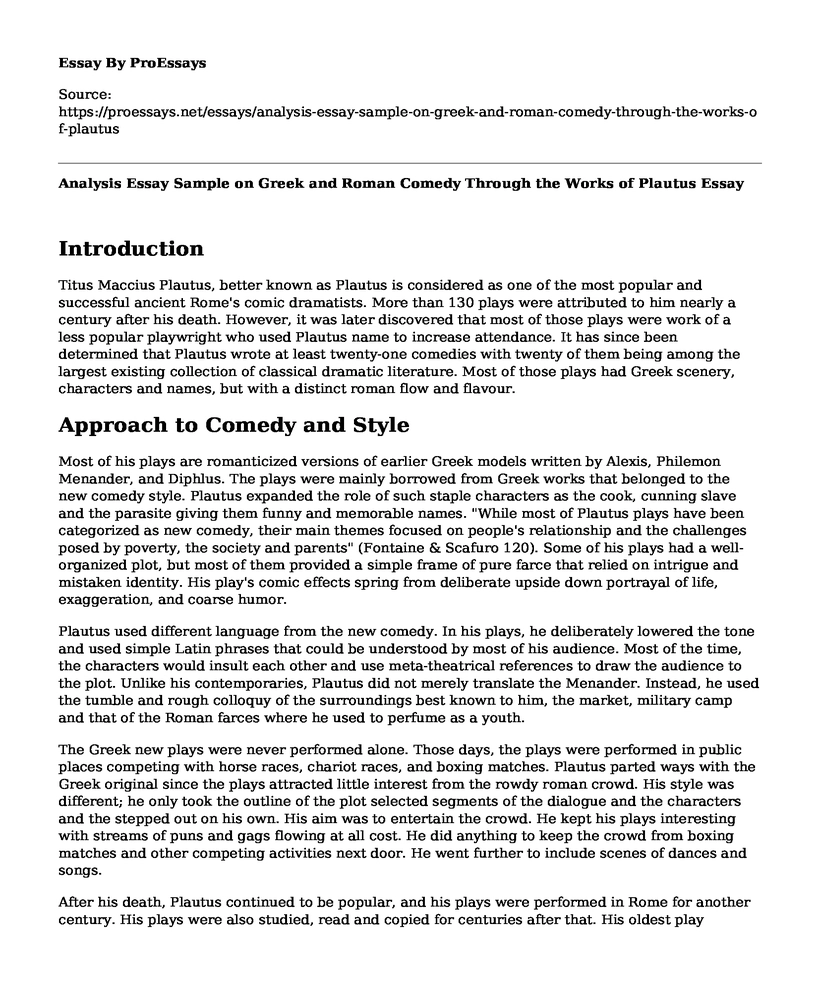Introduction
Titus Maccius Plautus, better known as Plautus is considered as one of the most popular and successful ancient Rome's comic dramatists. More than 130 plays were attributed to him nearly a century after his death. However, it was later discovered that most of those plays were work of a less popular playwright who used Plautus name to increase attendance. It has since been determined that Plautus wrote at least twenty-one comedies with twenty of them being among the largest existing collection of classical dramatic literature. Most of those plays had Greek scenery, characters and names, but with a distinct roman flow and flavour.
Approach to Comedy and Style
Most of his plays are romanticized versions of earlier Greek models written by Alexis, Philemon Menander, and Diphlus. The plays were mainly borrowed from Greek works that belonged to the new comedy style. Plautus expanded the role of such staple characters as the cook, cunning slave and the parasite giving them funny and memorable names. "While most of Plautus plays have been categorized as new comedy, their main themes focused on people's relationship and the challenges posed by poverty, the society and parents" (Fontaine & Scafuro 120). Some of his plays had a well-organized plot, but most of them provided a simple frame of pure farce that relied on intrigue and mistaken identity. His play's comic effects spring from deliberate upside down portrayal of life, exaggeration, and coarse humor.
Plautus used different language from the new comedy. In his plays, he deliberately lowered the tone and used simple Latin phrases that could be understood by most of his audience. Most of the time, the characters would insult each other and use meta-theatrical references to draw the audience to the plot. Unlike his contemporaries, Plautus did not merely translate the Menander. Instead, he used the tumble and rough colloquy of the surroundings best known to him, the market, military camp and that of the Roman farces where he used to perfume as a youth.
The Greek new plays were never performed alone. Those days, the plays were performed in public places competing with horse races, chariot races, and boxing matches. Plautus parted ways with the Greek original since the plays attracted little interest from the rowdy roman crowd. His style was different; he only took the outline of the plot selected segments of the dialogue and the characters and the stepped out on his own. His aim was to entertain the crowd. He kept his plays interesting with streams of puns and gags flowing at all cost. He did anything to keep the crowd from boxing matches and other competing activities next door. He went further to include scenes of dances and songs.
After his death, Plautus continued to be popular, and his plays were performed in Rome for another century. His plays were also studied, read and copied for centuries after that. His oldest play manuscript dates back to the 6th century, and the reappearance of his previously lost manuscripts increased his popularity during the Renaissance. His plays reappeared in theatres, and along with Terence, he is credited for influencing the European comic theatre evolution and inspiring comic writers such as Moliere and Shakespeare with his characterisation.
Works Cited
Fontaine, Michael and Adele C Scafuro. The Oxford handbook of Greek and Roman comedy. Oxford: Oxford University Press, 2014.
Cite this page
Analysis Essay Sample on Greek and Roman Comedy Through the Works of Plautus. (2022, Dec 03). Retrieved from https://proessays.net/essays/analysis-essay-sample-on-greek-and-roman-comedy-through-the-works-of-plautus
If you are the original author of this essay and no longer wish to have it published on the ProEssays website, please click below to request its removal:
- Critical Analysis of 1984 Essay
- Response to Maus' Interpretation of Shakespearean Comedy Essay
- Killings by Andre Dubus Essay Example
- The Moral Justification Against and in Favor of Torture in 1984
- Racism, Colonization, and Civilization Essay
- Essay Sample on Nixon's Vietnam War Policy: An Unsuccessful End to a Costly Conflict
- Essay Sample on WWII Legacy: Peace, Unity and Economic Development in China







